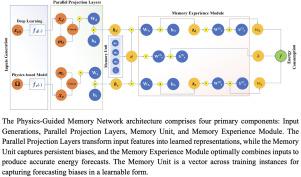用于建筑能量建模的物理引导记忆网络
IF 9.6
Q1 COMPUTER SCIENCE, ARTIFICIAL INTELLIGENCE
引用次数: 0
摘要
准确的能源消耗预测对于建筑行业的有效资源管理和可持续发展至关重要。深度学习模型非常成功,但与有限的历史数据作斗争,并且在历史数据不可用时变得不可用,例如在新建的建筑物中。另一方面,基于物理的模型,如EnergyPlus,可以模拟能源消耗,而不依赖于历史数据,但需要大量的建筑参数规范和相当长的时间来模拟建筑物。本文介绍了物理引导记忆网络(PgMN),这是一种神经网络,它集成了深度学习和基于物理的模型的预测,以解决它们的局限性。PgMN包括一个并行投影层(Parallel Projection Layers),用于处理不完整的输入;一个记忆单元(Memory Unit),用于解释持续偏差;一个记忆体验模块(Memory Experience Module),用于优化扩展预测,使其超出输入范围并产生输出。理论评估表明,PgMN的各个组成部分在数学上是有效的,可以执行各自的任务。PgMN以小时分辨率的短期能源预测进行评估,这对智能电网和智能建筑系统的运营决策至关重要。实验验证了PgMN在新建建筑、缺失数据、稀疏历史数据和基础设施动态变化等多种场景下的准确性和适用性。本文为动态建筑环境中的能耗预测提供了一个有前景的解决方案,增强了模型在历史数据有限或不可用或基于物理的模型不充分的情况下的适用性。本文章由计算机程序翻译,如有差异,请以英文原文为准。

Physics-Guided Memory Network for building energy modeling
Accurate energy consumption forecasting is essential for efficient resource management and sustainability in the building sector. Deep learning models are highly successful but struggle with limited historical data and become unusable when historical data are unavailable, such as in newly constructed buildings. On the other hand, physics-based models, such as EnergyPlus, simulate energy consumption without relying on historical data but require extensive building parameter specifications and considerable time to model a building. This paper introduces a Physics-Guided Memory Network (PgMN), a neural network that integrates predictions from deep learning and physics-based models to address their limitations. PgMN comprises a Parallel Projection Layers to process incomplete inputs, a Memory Unit to account for persistent biases, and a Memory Experience Module to optimally extend forecasts beyond their input range and produce output. Theoretical evaluation shows that components of PgMN are mathematically valid for performing their respective tasks. The PgMN was evaluated on short-term energy forecasting at an hourly resolution, critical for operational decision-making in smart grid and smart building systems. Experimental validation shows accuracy and applicability of PgMN in diverse scenarios such as newly constructed buildings, missing data, sparse historical data, and dynamic infrastructure changes. This paper provides a promising solution for energy consumption forecasting in dynamic building environments, enhancing model applicability in scenarios where historical data are limited or unavailable or when physics-based models are inadequate.
求助全文
通过发布文献求助,成功后即可免费获取论文全文。
去求助
来源期刊

Energy and AI
Engineering-Engineering (miscellaneous)
CiteScore
16.50
自引率
0.00%
发文量
64
审稿时长
56 days
 求助内容:
求助内容: 应助结果提醒方式:
应助结果提醒方式:


